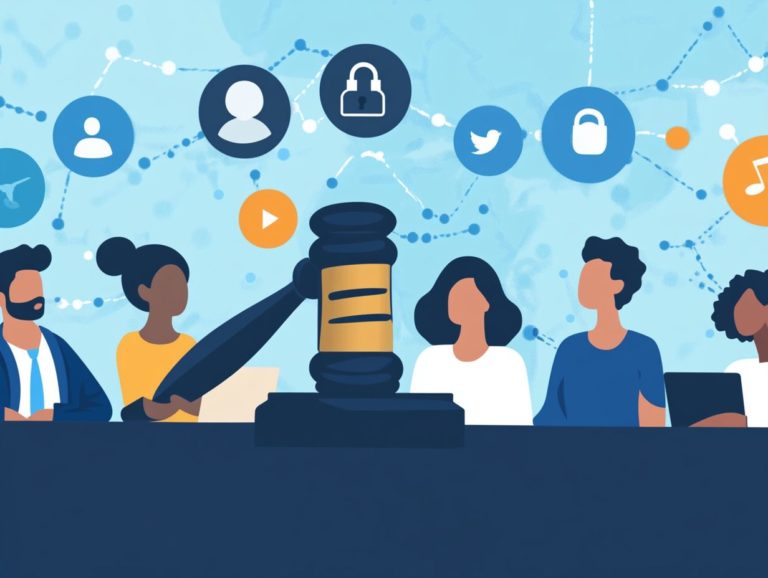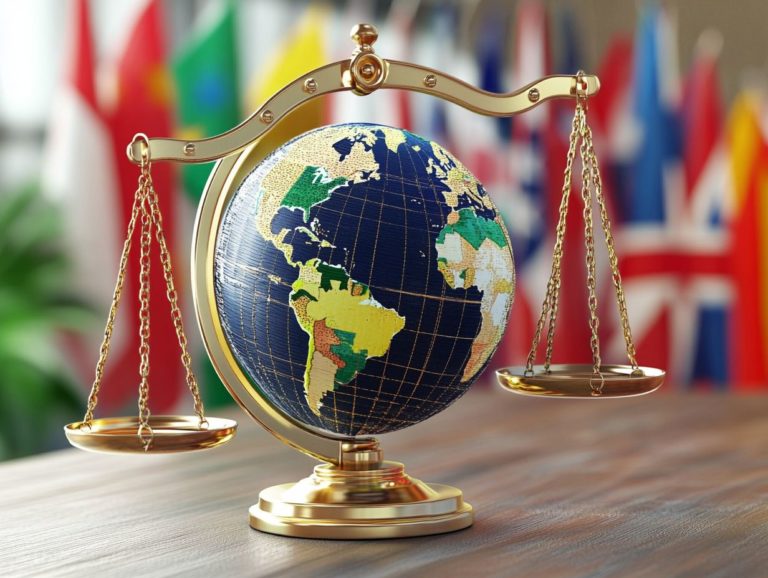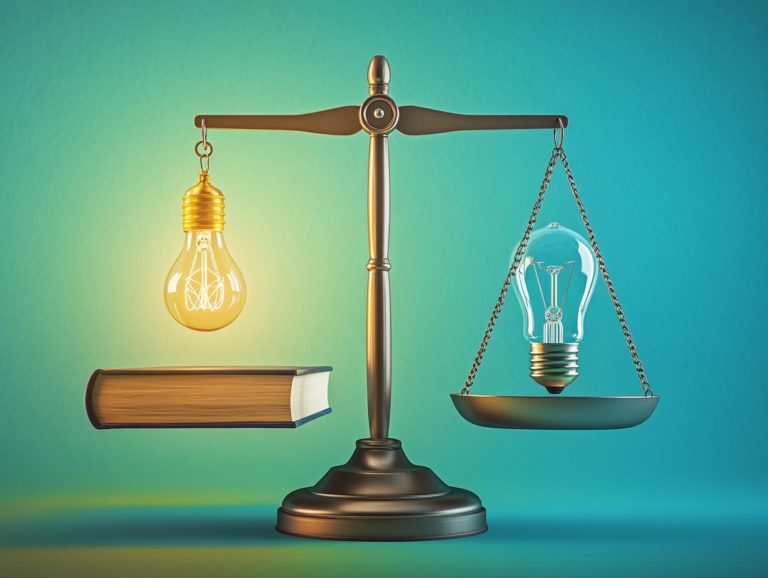5 Myths About Copyright Registration Debunked
Understanding copyright registration can feel like navigating a maze, often laden with misconceptions that may discourage you from protecting your valuable work.
You might think it’s an expensive and time-consuming endeavor or assume that only large corporations need to bother with registering their copyrights. The reality is far more nuanced than that.
This article aims to debunk five prevalent myths surrounding copyright registration, delve into what the process actually involves, and underscore its significance.
By the end, you ll possess a clearer perspective on how to effectively safeguard your creative endeavors.
Contents
- Key Takeaways:
- 1. Copyright Registration Is Expensive and Time-Consuming
- 2. Copyright Protection Is Automatic
- 3. Only Creative Works Can Be Copyrighted
- 4. Copyright Registration Guarantees Protection Against Infringement
- 5. Copyright Registration Is Only Necessary for Big Companies
- What Is Copyright Registration and Why Is It Important?
- What Are the Steps Involved in Copyright Registration?
- Frequently Asked Questions
Key Takeaways:

Copyright registration is affordable and quick.
You must register to gain legal standing.
Various works, including software and designs, can be copyrighted.
1. Copyright Registration Is Expensive and Time-Consuming
Copyright registration often comes across as an expensive and time-consuming endeavor. This perception can deter you from taking important steps to protect your original works.
This is especially true in a market increasingly dominated by manufacturers and retailers who may not fully grasp the significance of creative rights.
The costs associated with registration can vary widely, encompassing filing fees and potential legal consultations. This creates a barrier that can feel quite daunting.
Navigating the complexities of copyright laws adds another layer of difficulty, often requiring careful attention that can overwhelm someone without a legal background.
This perceived financial burden and bureaucratic maze can leave your works unregistered, making you vulnerable to infringement. Therefore, it’s crucial to recognize the importance of taking proactive measures to safeguard your intellectual property.
Doing so ensures that your artistic visions remain protected, and your rights upheld in an increasingly commercial landscape.
2. Copyright Protection Is Automatic
Many creators often assume that copyright protection kicks in automatically the moment they create their work. However, understanding copyright laws is essential to ensure that your rights as the original creator are fully acknowledged and enforceable.
While copyright protection is granted upon creation, this doesn’t diminish the advantages of formal registration. Registering your work establishes a public record of ownership and significantly bolsters your ability to take legal action if someone infringes upon your rights.
Registering your work opens the door to statutory damages (a set amount awarded for copyright infringement) and attorney’s fees, which can be crucial when enforcing those rights.
For anyone involved in creative pursuits, understanding these concepts gives you the power to protect your work and navigate the complexities of copyright with confidence.
3. Only Creative Works Can Be Copyrighted
It s a common misconception that only creative works can be copyrighted. In reality, copyright laws encompass a broad spectrum of intellectual property, including digital content, music, and even architectural designs.
This range includes everything from software code and databases to photographs and dance choreography. You might be surprised to learn that even a simple sketch or a unique website layout can receive copyright protection.
For instance, while an original song is easily recognized as copyrightable material, the strategic arrangement of a website or the layout of a magazine page also falls within this protective umbrella.
These protections not only uphold the rights of creators but also foster innovation across various media. By grasping the full scope of copyright, you can navigate the complexities of intellectual property rights with greater confidence and clarity.
Act now to ensure your creative work is protected!
4. Copyright Registration Guarantees Protection Against Infringement
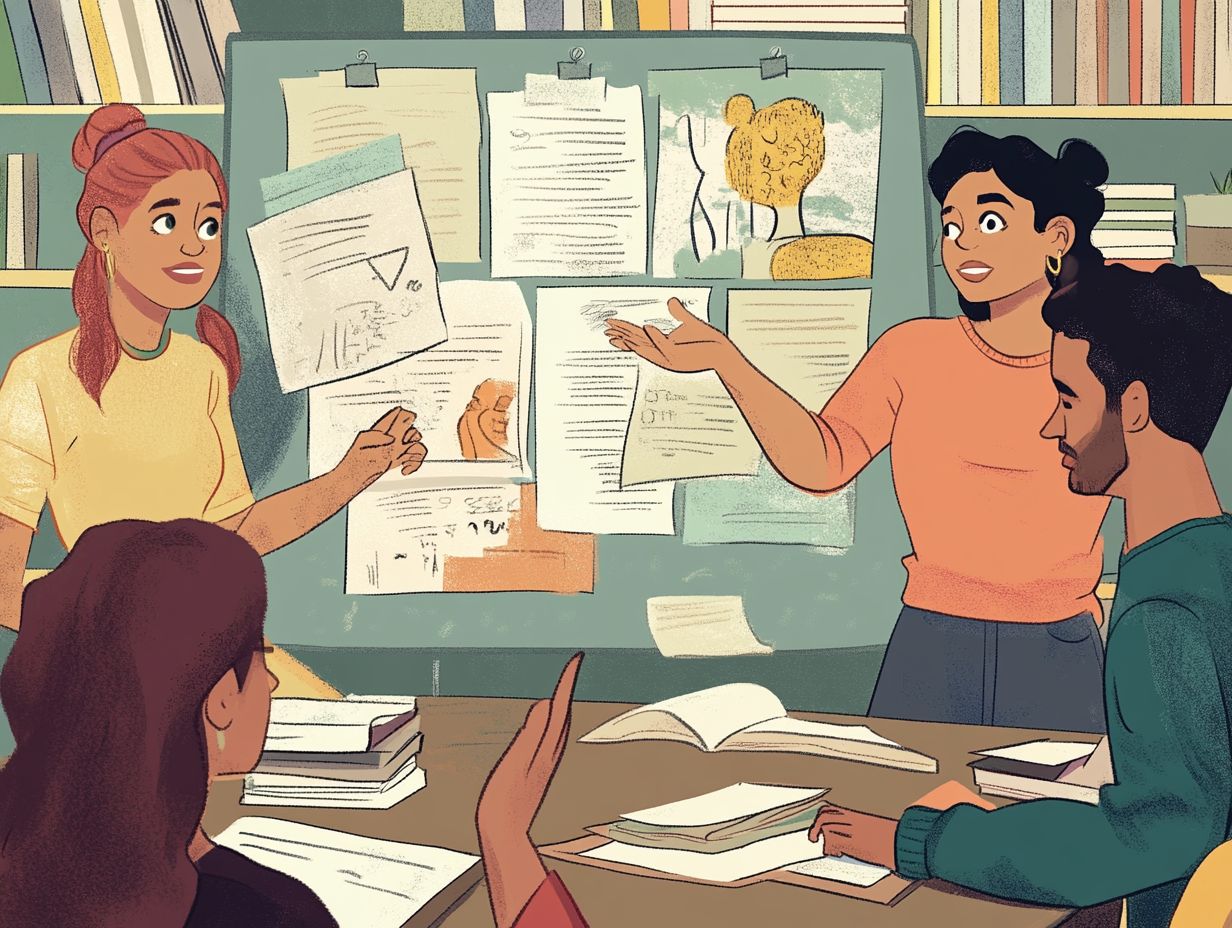
Obtaining copyright registration is an essential step for you as an artist seeking legal protection against infringement. It provides a robust foundation for taking legal action if violations arise.
When you register your work, you gain formal recognition that can significantly bolster your position in court. Take the landmark case of Walden v. Fiore. The court confirmed that having a registered copyright opens the door to set fines defined by law, which can substantially increase the financial penalties for infringement serving as a powerful deterrent for potential violators.
With a registered copyright, you streamline the process of proving ownership. It establishes a public record of your claim. This legal framework not only enhances the credibility of your work but also gives you the power to pursue contracts and collaborations with greater confidence, knowing you have solid protections in place.
5. Copyright Registration Is Only Necessary for Big Companies
The belief that copyright registration is only necessary for big companies often leads you, as a small artist, to overlook this vital step. This can leave you vulnerable to potential infringement by manufacturers or other entities.
This misconception can hurt your rights, as even your small creations are at risk of unauthorized use or exploitation. Without proper registration, you may struggle to assert your rights effectively when faced with infringement.
Registering a copyright not only provides you with essential legal documentation but also establishes a public record of ownership, which can act as a deterrent to potential violators.
In today s digital marketplace, where your creative works can be easily shared and replicated, taking this crucial step becomes imperative. Don t let your hard work go unprotected register today! It serves as a proactive measure to safeguard your artistic endeavors and ensures that your hard work is recognized and respected.
What Is Copyright Registration and Why Is It Important?
Copyright registration is a legal process that formalizes your claim to your original work, offering essential protection under copyright laws. This step is crucial for safeguarding your creative rights and intellectual property from unauthorized use.
By registering your work, you assert your ownership and unlock access to legal recourse in cases of infringement. The process involves submitting an application along with a copy of your work to the relevant government office, usually with a fee attached.
Through registration, you establish a public record of your rights, which can deter potential infringers and serve as vital evidence in court should disputes arise.
In the broader context of intellectual property law, copyright registration plays a pivotal role in bolstering the creative economy and fostering innovation by ensuring that you are recognized and compensated fairly for your contributions.
What Are the Steps Involved in Copyright Registration?
The process of copyright registration involves several critical steps that you must navigate with care. It starts with completing an application, submitting your work, and paying a fee.
This makes it essential for you, as a creator, to seek legal advice to ensure compliance with copyright laws. Navigating this intricate procedure requires your careful attention to detail; even minor errors can lead to significant delays or denials of protection.
First, you need to determine the appropriate category for your work, as this will influence how your application is structured. Once you’ve filled out the form, you must submit a copy of the actual work to substantiate your claim, which means understanding the specific requirements for different types of material.
Timely payment of the associated fee is crucial; missing deadlines can jeopardize the entire effort. Therefore, consulting with an expert in copyright law is highly advisable. Doing so can help you avoid common pitfalls and ensure that your artistic expressions are properly safeguarded.
What Are the Benefits of Copyright Registration?

Copyright registration brings a wealth of advantages that you shouldn t overlook. It enhances your legal protections and gives you the power to pursue licensing agreements while providing a robust defense against any copyright infringement claims.
By formally registering your work, you not only secure your rights but also open doors to legal avenues that can deter unauthorized use. Registering your work lets you present it confidently, knowing you have solid legal backing should any disputes arise.
Having your copyrights registered can smooth out negotiations for licensing deals. Potential partners view registered works as more credible and trustworthy, leading to a wealth of monetization opportunities and ensuring you receive fair compensation for your creative contributions.
What Are the Common Misconceptions About Copyright Registration?
Several misconceptions surround copyright registration that you should be aware of. For instance, some believe it is unnecessary for digital content or that it automatically guarantees protection against all forms of unauthorized use. Additionally, understanding the common myths about trademarks can help clarify your rights and responsibilities.
Many creators mistakenly assume that simply posting their work online is enough for legal protection. Without proper registration, your ability to enforce your rights in court could be significantly weakened.
A digital artist might think their uploaded artwork is safe just because it carries their name, yet they could encounter difficulties if someone uses it without permission. Furthermore, some believe that once a work is registered, it is completely shielded from unauthorized use.
In truth, registration is merely the first step in asserting your rights; ongoing vigilance is essential for safeguarding your creative endeavors.
How Can One Protect Their Copyright Without Registration?
While registration certainly offers significant advantages, there are effective ways to protect your copyright without going through the formal process. Understanding fair use, which is the legal allowance to use someone else’s work under specific conditions, and keeping meticulous records of your creative journey can be invaluable.
You can employ various methods to safeguard your work. For instance, using digital timestamps can log the creation date of your content, serving as compelling proof of authorship if disputes arise.
Additionally, implementing watermarking techniques in your digital images or videos not only deters unauthorized use but also visually asserts your ownership in a striking way.
Having a solid grasp of copyright laws is essential. It gives you the power to navigate potential infringements with confidence and enables you to make informed decisions about your creative endeavors.
What Are the Consequences of Not Registering a Copyright?
Neglecting to register a copyright can have serious repercussions for artists like you. It can leave you unable to enforce your rights against unauthorized use and miss out on valuable licensing opportunities.
Without proper registration, you may find yourself exposed to unauthorized use of your work, leading to potentially significant financial losses. This lack of protection jeopardizes your unique creations and can stifle opportunities for collaboration and partnerships.
If unauthorized use occurs, you might struggle to claim damages, as unregistered works often lack the legal backing they merit. Ultimately, overlooking this crucial aspect of copyright could threaten your artistic integrity and diminish your chances of thriving in a competitive industry.
Frequently Asked Questions
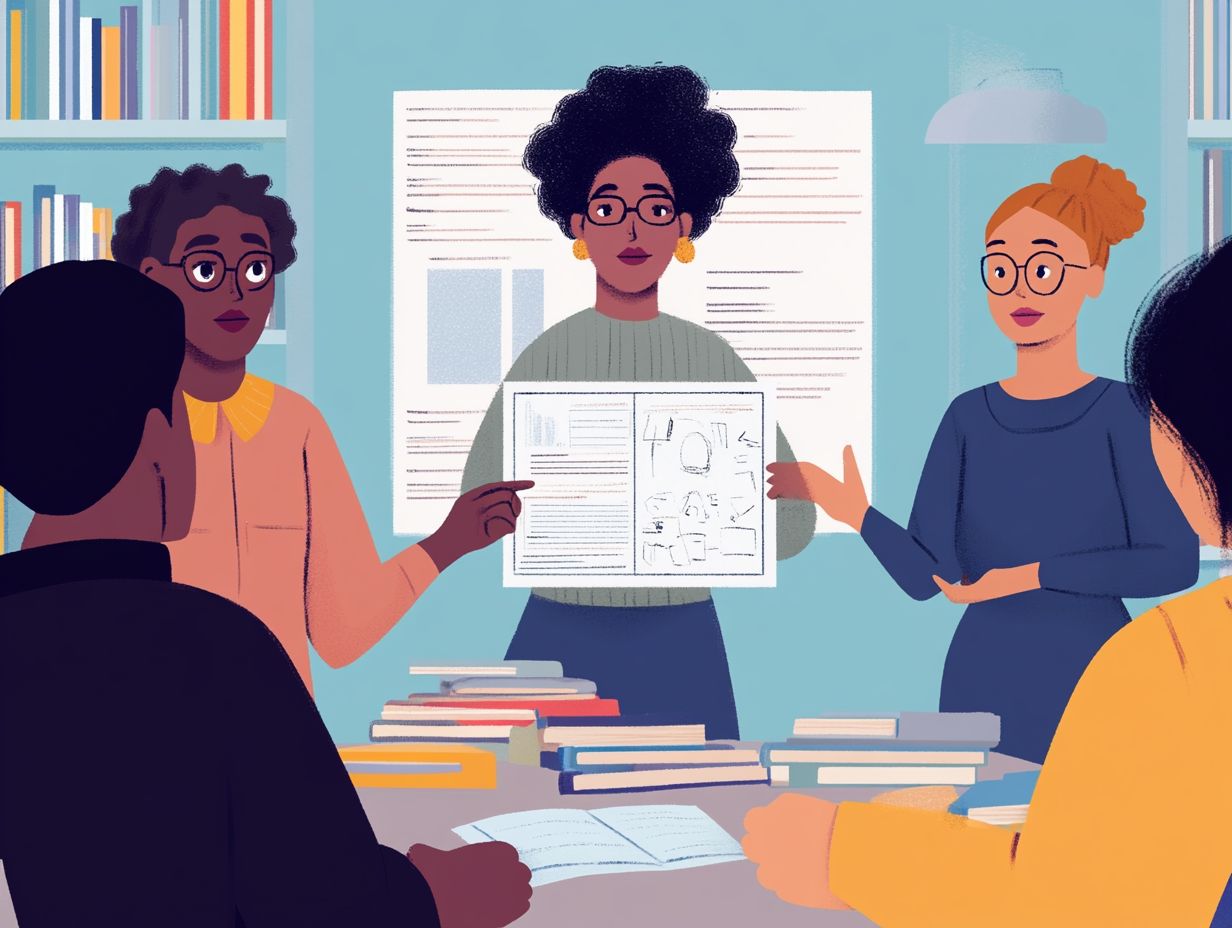
What are some common myths about copyright registration?
Myth: Copyright registration is not necessary as soon as I create something. Fact: While copyright automatically exists as soon as you create something original, understanding myths about licensing agreements can help clarify why registration gives you additional legal protection and benefits.
Is copyright registration expensive?
Myth: Copyright registration is too expensive for me to afford. Fact: The cost of copyright registration is relatively inexpensive and can be done online for a minimal fee. For more insights, check out 5 things you didn’t know about copyright law. It is a small price to pay for the protection and benefits it provides.
Do I Have to Register Each Individual Work?
Myth: I need to register each individual work for copyright protection.
Fact: You can register a collection of works with one registration. This is possible as long as they are created by the same author(s) and are published together.
Can I Only Register My Work Once?
Myth: Once I register my work, it is protected forever.
Fact: Copyright protection lasts for the author’s life plus an additional 70 years after their death. If you make significant changes or updates, you can register it again to enhance your protection.
Do I Have to Wait Until My Work is Published to Register It?
Myth: I can only register my work once it is published.
Fact: You can register your work any time, whether it is published or not. Registering before publication gives you extra benefits and legal protections.
Does Copyright Registration Protect Me from All Forms of Infringement?
Myth: Once I register my work, I am fully protected from all forms of infringement.
Fact: Copyright registration offers essential legal protections, but it does not guarantee complete immunity from infringement. Actively monitoring your work is crucial for ongoing protection.


